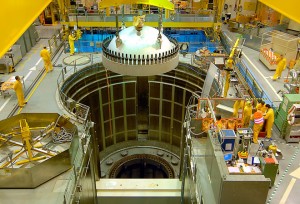UK regulators clear ABWR Nuclear Power design for next step
Horizon nuclear power has moved one step closer to deployment of the UK Advanced Boiling Water Reactor (UK ABWR) following confirmation from nuclear and environment regulators that the design has been cleared to move on to Step 3 of the Generic Design Assessment (GDA) process in September. The design will be used in nuclear power stations to be built at Wylfa in Anglesey and Oldbury in Gloucestershire.
Ken Sato, General Manager–Licensing of Horizon parent company Hitachi-GE Nuclear Energy, said: “Progression to Step 3 shows the significant and sustained progress we have made. We are delighted to have met this important milestone and be on schedule for completion of the GDA by the end of 2017.
“GDA is rightly a thorough and rigorous assessment, and we look forward to providing further, increasingly detailed, submissions to the regulator throughout the coming months.
“Hitachi-GE now has a team of more than 40 experts working on GDA-alone across three locations in the UK, supported by a wider team from across the Hitachi group.
He continued: “The ABWR is a proven technology and is the only generation III+ reactor which has entered operation anywhere in the world. Its construction at Wylfa then Oldbury will create many thousands of jobs, and its operation will produce the secure, sustainable and affordable energy which the UK needs.
Chief Operating Officer of Horizon Nuclear Power, Mr Alan Raymant, said: “We welcome the positive progress Hitachi-GE is making on this crucial element in moving forward our plans to provide secure, low-carbon and affordable electricity for the UK.
“Following the recent positive announcement on Regulatory Justification and with the launch of our first round of public consultation in September, it shows that we are well on track for first power generation in the first half of the 2020s.”
Up to 6,000 jobs are expected to be created while the new reactors are built and around 1,000 when the plant is operating.
The regulatory bodies carrying out the GDA – the Office for Nuclear Regulation (ONR), the Environment Agency (EA) and Natural Resources Wales (NRW) – released a series of reports detailing their conclusions after the completion of the second stage of the four-step GDA process. After the first preparatory stage, step 2 saw the beginning of the technical assessment of the design, with the regulators focusing on understanding and assessing fundamental safety claims and the acceptability of the ABWR within the UK regulatory regime.
The regulators said that they have not, at this stage, identified any fundamental safety, security or environmental issues that would make the ABWR unacceptable for construction and operation in the UK.
Environmental regulators EA and NRW found that the annual radiation impact on people from an ABWR would be below relevant UK dose limits and constraints, and radioactive discharges would not exceed those of comparable power stations. However, the regulators have requested further information from Hitachi-GE to enable it to carry out a detailed assessment.
Nuclear regulator ONR is tasked with assessing the fundamental safety and security aspects of the design. The ONR praised its interactions with Hitachi-GE during the second step as positive, describing the company as “open to constructive challenge and engagement”.
The ABWR design is already licensed in Japan and the USA. Four units have been built in Japan, and two are currently under construction in Taiwan.
Source: Hazardex
 español
español
 français
français




